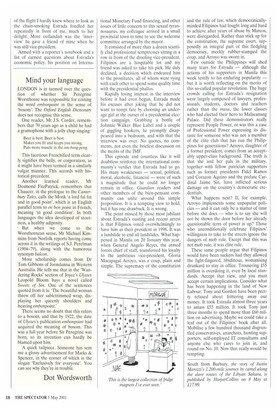Mind your language
LONDON is in turmoil over the question of whether Sir Peregrine Worsthorne was responsible for coining the word embonpoint in the sense of 'bosom'. The Oxford English Dictionary does not recognise this sense.
One reader, Mr J.S. Corder, remembers that 70 years ago as a child he had a gramophone with a jolly chap singing:
Beer is best. Beer is best.
Makes you fit and keeps you strong. Puts more muscle in the om-bong-pong.
This facetious Frenchified term clearly signifies the belly, or corporation, as it might have been termed in a similarly vulgar manner. This accords with historical precedent.
Another learned reader, Mr Desmond FitzPatrick, remembers that Chaucer, in the prologue to the Canterbury Tales, calls the Monk 'a lord ful fat and in good point', which is an English parallel term to en bon point in French, meaning 'in good condition'. In both languages the idea developed of stoutness, a healthy adiposity.
But when we come to the Worsthornean sense, Mr Michael Kimmins from Norfolk reports having come across it in the writings of S.J. Perelman (1904-79), along with the humorous synonym balcon.
More scholarship comes from Dr Tom Gibbons of Joondanna in Western Australia. He tells me that in the 'Wandering Rocks' section of Joyce's Ulysses Leopold Bloom buys a novel called Sweets of Sin. One of the sentences quoted from it is: 'The beautiful woman threw off her sabletrimmed wrap, displaying her queenly shoulders and heaving embonpoint.'
There seems no doubt that this refers to a bosom, and that by 1922, the date of U4rsses's publication embonpoint had acquired the meaning of bosom. This was a full year before Sir Peregrine was born, so its invention can hardly be blamed upon him.
A quick tailpiece. Someone has sent me a glossy advertisement for Marks & Spencer, in the corner of which is the slogan 'Exclusively for everyone'. You can see why they're in trouble.
Dot Wordsworth










































































 Previous page
Previous page